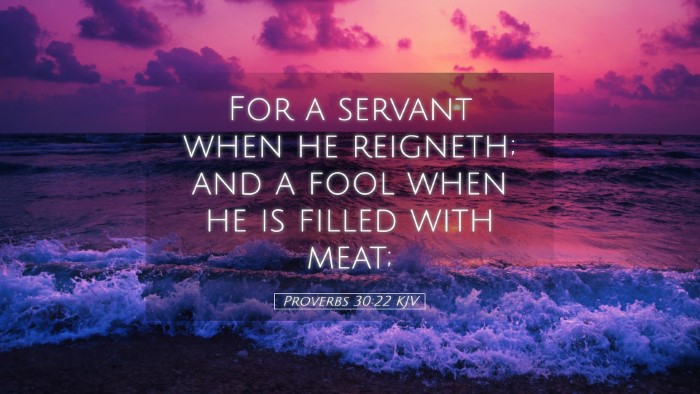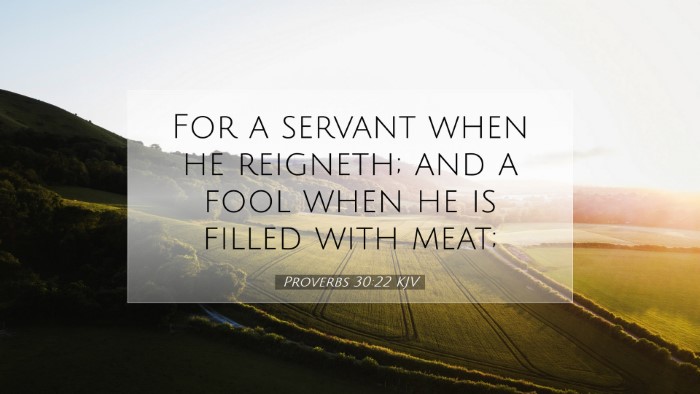Commentary on Proverbs 30:22
Verse Context: Proverbs 30:22 states: "For a servant when he reigneth; and a fool when he is filled with meat." This verse is part of the observations made by Agur, proceeding with a series of four things that are unthinkable and typically denote a distortion of natural order.
Understanding the Text
This verse presents a paradoxical situation where those who are not typically in positions of authority or wisdom seem to ascend to them. Agur points out the social dynamics that arise when a servant comes to power or a fool enjoys abundance. This can provoke a sense of moral or cosmic disorder.
Insights from Matthew Henry
Matthew Henry highlights that the verse illustrates the changeable nature of fortune, showing how even the lowest in society can be elevated to positions of influence. He remarks on the folly of elevating those who are not deserving, emphasizing the chaos that ensues when the true order of wisdom and authority is inverted.
- Elevation of the Unworthy: Henry suggests that this is a warning against underestimating the complexities of human relationships and the unpredictable shift of power.
- Folly of the Fool: The commentary reflects on how abundance can magnify a fool's foolishness, leading to destructive results.
Insights from Albert Barnes
Albert Barnes provides a more analytical perspective, contemplating the societal implications of the servant's rise and the fool's feasting. He emphasizes the problems seen in governance when those without wisdom or experience rise to prominence.
- Social Order: Barnes comments on how social order relies on the wise and capable leading, while the foolish should remain subordinate. The rise of the unfit can lead to societal breakdown.
- Moral Reasoning: He also asserts that those who are foolish do not grow wise through material wealth, but often become more obstinate in their foolishness.
Insights from Adam Clarke
Adam Clarke's commentary delves into the metaphorical significance of the verse, suggesting it speaks to broader human conditions and societal wisdom. He views the servant and the fool as representations of broader themes of human folly.
- Implications of Authority: Clarke discusses how authority granted to the wrong individuals can serve as a cautionary tale for leaders. Those elevated without character are prone to misuse their power.
- Nature of Fools: He posits that fools, regardless of prosperity, often squander their opportunities, making their temporary elevation a tragic farce.
Theological Reflections
This verse invites profound theological reflection on the nature of divine justice and the ways of the world. It resonates with the understanding that God often permits societal structures to function in ways that reflect the corruption of human nature.
- Divine Sovereignty: The commentary suggests that God's sovereignty allows for these paradoxical occurrences, which in turn point to the brokenness of the world.
- Call to Wisdom: Ultimately, the text serves as a call to seek wisdom and discernment, as the elevation of the unworthy illustrates the need for wise leaders and moral clarity.
Practical Applications
For pastors, students, and theologians, Proverbs 30:22 offers several applicable lessons:
- Discernment in Leadership: Encouragement for the selection of leaders who display wisdom and moral integrity over those with mere popularity or wealth.
- Awareness of Human Nature: Understanding that material wealth does not equate with wisdom or morality; true leadership requires character.
- Emphasis on Wisdom: A reminder of the importance of humility and the pursuit of wisdom in all aspects of life, particularly in leadership.
Conclusion
Proverbs 30:22 serves as a reminder of the peculiarities of human nature and the often-reversed hierarchy of wisdom and authority. As we study this verse in the light of public domain commentaries, the collective insight of biblical scholars offers a deeper understanding of its implications for individuals and society as a whole. It challenges us to reflect on our own roles within our communities, encouraging us to pursue wisdom and justice in all areas of life.


